Ey up! In this blog post I am going to be listing and explaining just a small proportion of the words and phrases that were once or still are heard on the streets of Sheffield. I asked the people of Sheffield to tell me about their dialect and they provided me with the goods. The words that have been included have been sent to me by Sheffield people themselves. If you can think of any more or recognize any of the ones that I’m going to share with you then please let me know in the comments.
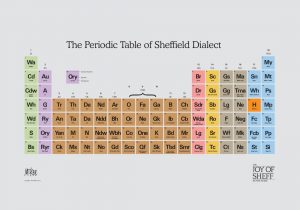
I have consulted some of the available Sheffield Dialect Glossaries of the past which I could find in the University of Sheffield’s Western Bank library – as well as one’s which I have at home – to see which words have had their use attested in previous centuries.
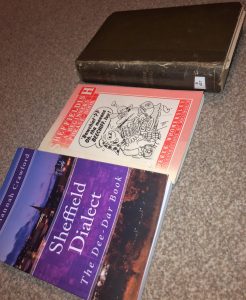
‘Nah Then!’ is a common way to greet your fellow Sheffielders or to instigate a conversation. This can still be heard on the streets of Sheffield, where you might hear someone instigate a conversation with an old friend with the phrase ‘Nah then pal, how’s it going?’. Nah then or ‘Naden’ as Whomersly puts it in his 1981 ‘Sheffieldish: A Beginners Phrase-book’, can also be used in a more confrontational context, when someone is trying to instigate an argument or to answer back.
Laik is a more traditional dialect word, used in the context of ‘playing out’ or hanging with friends as a youngster, and we would expect it to be heard in the phrase ‘are tha laikin’?’. This term is found in the Hallamshire Glossary of local dialect words produced by Sheffield born Rev. Joseph Hunter between 1828-31. Hunter collected these words during a 20 year period between 1790 and 1810.
Flit is a traditional Sheffield word which is used in the context of relocating or moving house, also attested in the Hallamshire Glossary. If a family on your street have flitted they have moved to another area.
Reckon up is a phrase which in Sheffield means adding up or calculating an amount of money. I have previously heard this used in the context of bar staff adding up the cost of a round of drinks when serving customers, where being able to reckon up without using the till is a vital skill on a busy shift. The use of the term ‘Reckon Up’ to mean ‘to calculate or estimate’ is evidenced on the EDD (English Dialect Dictionary) Online. This is a webiste which can be used to search for meanings of Dialect words and to find evidence of when and where the term has been used in the past, and can be accessed by the following link http://eddonline-proj.uibk.ac.at/edd/index.jsp
Another word that I have been provided with is Champion, one of the words that Sheffielder’s use to mean ‘great’ or ‘excellent’ – as defined by Hannah Crawford (2015) in her ‘Dee-Dar Book’ of Sheffield Dialect and folklore – so that we might hear the phrase ‘Sheffield is Champion!’.
Loppy is another word, used for being filthy or unclean. If your dog came home from a walk in the rain and was covered in mud and puddle water it would be referred to as loppy. It is mentioned by Crawford (2015) as meaning ‘dirty’.
Somebody who is Nesh feels the cold more than other people, or is feeling cold in that particular moment. This more contemporary meaning which is also found in the Hallamshire glossary, has however changed since that attested in Abel Bywater’s ‘The Sheffield Dialect’ glossary from 1854, in which Nesh means ‘poor spirited.’
Siling down is used when it is raining heavily. The word Sile is found in the book ‘A Glossary of Words used in the Neighbourhood of Sheffield’, compiled by S.O. Addy in 1888, with the definition ‘to rain hard’. This glossary was written for the English Dialect Society at a time when efforts were being made to preserve and documents features of local dialect through the compilation of a series of dialect glossaries from various parts of the UK.
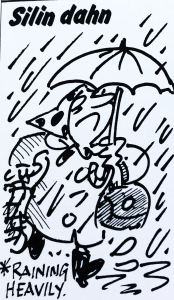
Also attested in the same glossary, and still in use, is the word Pikelet. In Sheffield this now generally refers to what are more widely known as crumpets, however traditionally Pikelets were a seperate thing, defined in Addy’s 1888 glossary as ‘a thin round cake, made of flour, eggs, milk and yeast.’
Dishclout is another term that was mentioned to me, which denotes a dish cloth often made from an old vest or pair of pants – always handy for spillages – another one that is attested in Addy’s 1888 glossary.
Mardy Thanks to the Arctic Monkeys everybody knows of the Sheffield Dialect phrase ‘Mardy Bum’, which is used to refer to a person who has ‘got the face on’ or in other words is sulking and being moody. This word has been around a long time, and we know this because it is listed in dialect glossaries since as far back as Addy’s in 1888, where it is defined as referring to ‘a spoiled child.’
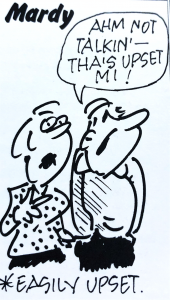
Love or Duck are commonly used as a term of address by Sheffielder’s, as pointed out in Whomersly’s (1981) ‘Sheffieldish’ phrasebook, in the statement ‘You must not be shocked when you are addressed as ‘luv’ or ‘duck’, aimed at newcomers to Sheffield.
Spice is the word that some Sheffielder’s use to name sweets or confectionary, or as mentioned in the Hallamshire Glossary ‘any sweetmeats given to children’ (1983:84) as the meaning used to extend to dried fruits, puddings and deserts.
Snap is what Sheffielders call food on the go or a packed dinner which somebody takes to work to eat. This is found in Addy’s 1888 Glossary, and here we learn that this word was most commonly used amongst workmen, and thus we might have expected its use to be traditional of industrial life in Sheffield and common within mining and steelworks communities. And to avoid any confusion in the use of the word dinner, this is used for the meal at midday, with tea being used to refer to the meal that is eaten in the early evening or at teatime – Sheffielder’s use the ‘Breakfast-Dinner-Tea’ format as opposed to ‘Breakfast-Lunch-Dinner’.
In case you were wondering where Sheffielder’s stand in the whole bread debate, in the steel city you will find the word Breadcake, not roll or bap or barm. On every chip shop menu in the city you will find the term ‘breadcake’ under side/extras.
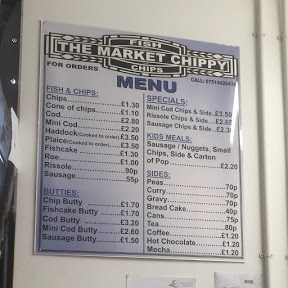
And that small passageway that you use as a shortcut between two streets or blocks of houses, that’s a Jennel in Sheffield, not a ginnel or alleyway. This word is found in Addy’s 1888 glossary of Sheffield words, defined as ‘an entry, a narrow passage between two or more houses.’
Just to confuse you even more, Sheffielder’s will substitute til in phrases such as ‘9 til 5’ for while. This is something that I personally didn’t realise was a Sheffield feature until leaving Sheffield and telling my non-Sheffield work colleagues that I was working a 7 while close to be met with a stark lack of understanding.
Fettle which means ‘to make clean’, is another word which has been part of the discussion. This word can be found in both the Hallamshire Glossary and Addy’s Sheffield Glossary of 1888. We would expect to hear this term in a phrase such as ‘I need to give my living room a good fettle.’
Now obviously these are just a small minority of the many Sheffield Dialect words that can be heard on the streets of Sheffield. There are also many words from the past that are falling out of use or have already been lost. If you are interested in me writing further posts like this one where I write about more dialect words and phrases please let me know in the comments. And again if there are any more that you know of and would like to share, or if you recognise or use any of the ones above, then please feel free to comment below!
Johanna Blakey is studying for a PhD in English Language and Linguistics at the University of Sheffield. Her main focus is on the dialect of Sheffield. She writes the blog Steel City Spiel, which is where this post was first published.
References
Addy, Sidney Oldall. 1888. A Glossary of Words Used in the Neighbourhood of Sheffield, English Dialect Society (London: Trübner)
Bywater, Abel. 1854. The Sheffield Dialect (Sheffield: Rodgers and Fowler)
Crawford, Hannah. 2015. Sheffield Dialect: The Deer-Dar Book (Great Britain: Amazon)
Hunter, Joseph. 1983. The Hallamshire Glossary (Sheffield: University of Sheffield, Centre for English Cultural Tradition and Language)
Whomersley, Derek. 1981. Sheffieldish: A Beginners Phrase-Book (Sheffield: City of Sheffield Publicity Department)

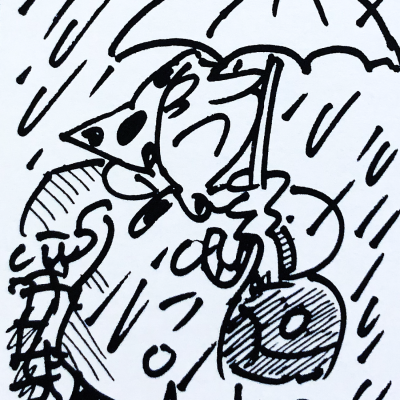






Some words are almost the same in Danish. In Denmark, you can greet friends with “Nå, så” (Well, then). To move is “at flytte”. To do math is called “at regne”. Play is called “leg” (e pronounced as a, g as j). When its really raining we say “regnen siler ned” (the rain is siling down).
Indeed, I also noticed the Scandinavian influence. They are probably loans from Dano-Norwegian going back to the Viking period.